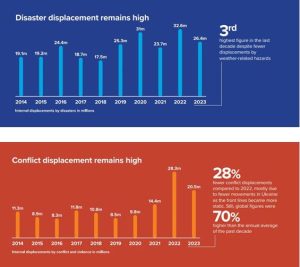Almost 76 million people now internally displaced
 A record 75.9 million people are now displaced within their own countries because of conflict and climate change-driven natural disasters, according to a new report.
A record 75.9 million people are now displaced within their own countries because of conflict and climate change-driven natural disasters, according to a new report.
The Global Report on Internal Displacement (GRID) by the IOMs ‘Internal Displacement Monitoring Centre’ (IDMC) said nearly 47 million new internal displacements, or movements, were registered in 2023, highlighting the urgent need to protect internally displaced people and prevent future displacements.
International Organization for Migration (IOM) Deputy Director General Ugochi Daniels said the numbers were unprecedented.
“As the planet grapples with conflicts and disasters, the staggering numbers of 47 million new internal displacements tells a harrowing tale,” Ms Daniels said.
“This report is a stark reminder of the urgent and coordinated need to expand disaster risk reduction, support peacebuilding, ensure the protection of human rights and whenever possible, prevent the displacement before it happens.”
The report shows that conflict and violence triggered 20.5 million displacements. Of these, Sudan accounted for almost 30 per cent, while the Gaza strip accounting for 17 per cent – 3.4 million – in the last three months of the year.
It says disasters also continue to displace millions of people every year. In 2023, disasters such as cyclone Freddy in south-eastern Africa, earthquakes in Turkey and Syria, and cyclone Mocha in the Indian Ocean led to 26.4 million movements, accounting for 56 per cent of the total new internal displacements.
Also, there was a rise in disaster-induced displacements in high-income nations, exemplified by Canada, where an unprecedented wildfire season led to 185,000 internal displacements.
In the years to come, the number of people displaced by disasters is expected to rise as the frequency, duration, and intensity of natural hazards worsen in the context of climate change we are seeing such tragedies occurring in the last weeks in Brazil and in Kenya, the report says.
It says that despite these challenges, knowledge gaps remain, and the international community needs better data to understand, prevent, manage and address internal displacement in conflict and disaster contexts.
“The report is an invaluable tool for humanitarian and development partners, governments, and a range of diverse stakeholder groups as they work to resolve existent displacements and prepare for future displacements,” Ms Daniels said.
The IDMC and the GRID report is aimed at providing reliable and accurate data through its Displacement Tracking Matrix (DTM).
The DTM serves as the world’s largest source of primary data on internal displacement, informing 81 per cent of the Humanitarian Needs Overview and Humanitarian Response Plans.
Read the full report: Global Report on Internal Displacement | IDMC – Internal Displacement Monitorning Centre (internal-displacement.org)












